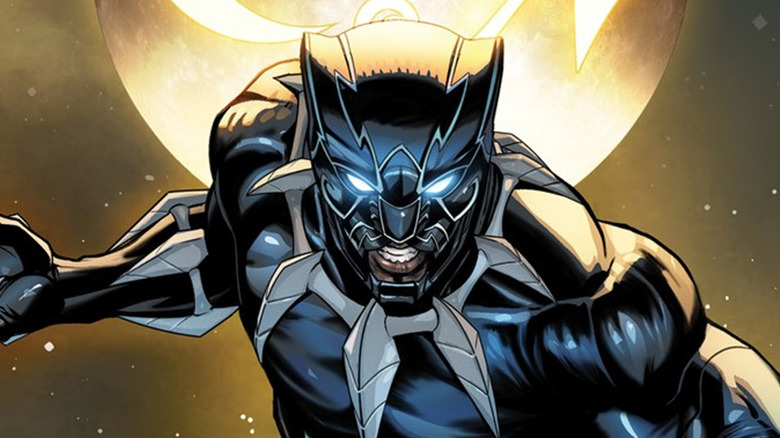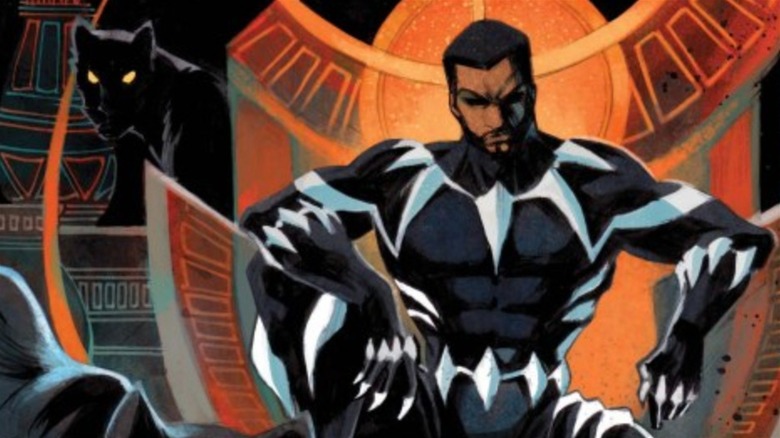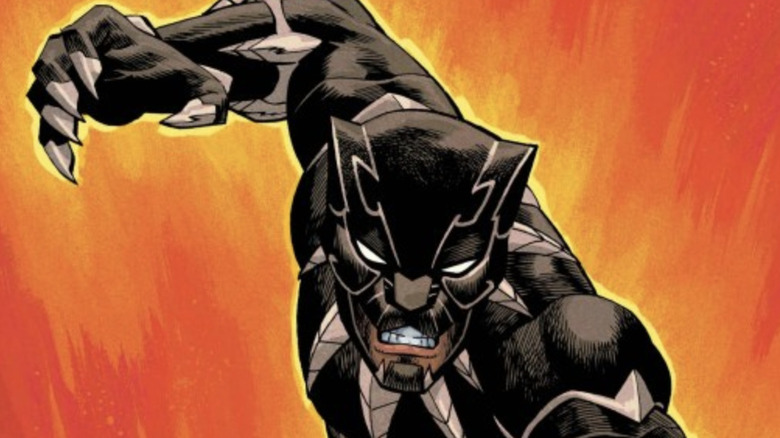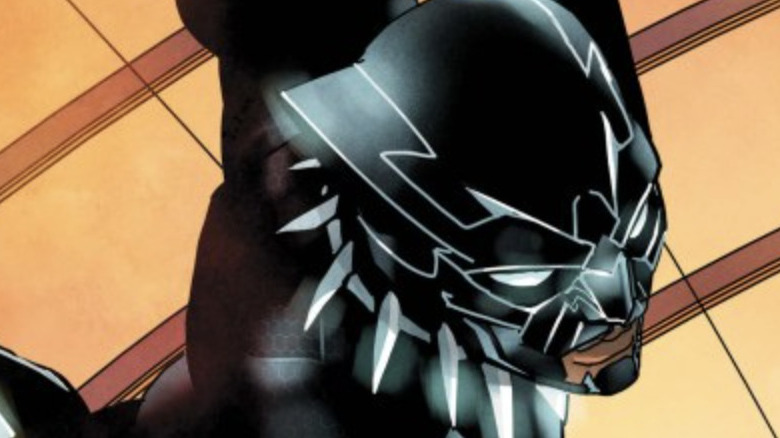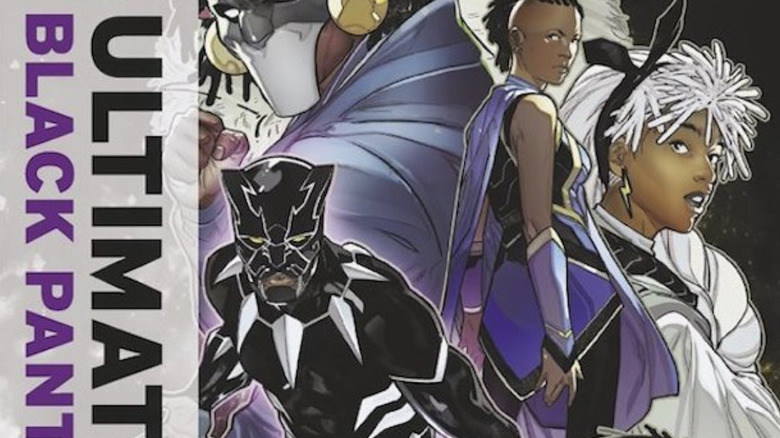Marvel's New Black Panther Writer Teases 'Epic Territory' & A New Kind Of Wakanda - Exclusive Interview
As part of Marvel's new Ultimate Universe, spearheaded by Jonathan Hickman, Black Panther is about to star in his own solo series filled with plenty of action, superheroics, and political conflict. Spinning out of the events of "Ultimate Invasion," "Ultimate Black Panther" (by Bryan Edward Hill, Stefano Caselli, David Curiel, and VC's Cory Petit) is a fresh take on the iconic Marvel hero, reinventing him, his closest enemies and allies, and Wakanda in a brand-new ongoing story. The book will bring in familiar elements of Black Panther's history but forge a new path for the hero.
In Looper's exclusive interview with Hill, writer of "Titans" on Max and several comic book projects (including "Blade"), he discussed tackling the newest Black Panther story set in the Ultimate Universe. We spoke about how the project came to be, ways the series is influenced by the current mainstream narrative, new looks and story changes for characters, as well as what's coming next in "Ultimate Black Panther." Check out our full conversation below.
Tackling Black Panther in the Ultimate Universe
So, how did "Ultimate Black Panther" come to be?
Well, I don't have a ton of time to write a lot of books, honestly. I mean, I've got the screenwriting and the getting into filmmaking, and the rest of it, so I'm really picky about what I'm going to work on. But when Will Moss, an editor and friend of mine, reached out to me over at Marvel and said that [Jonathan] Hickman was doing the Ultimate stuff ... I mean, Jonathan and I have been friends for a long time, and I have deep respect for how he's able to world-build and do all of those things. And then, the idea of writing Black Panther was kind of interesting.
I had done a single issue of a thing a while ago, but it was a good opportunity to get in from the ground up, control things tonally, and add some scope to the lore and character. And this isn't a criticism of anyone's previous work, but for me, I wanted to take Wakanda and Black Panther into more of an epic territory. It's this unique thing in the Marvel Universe in the sense that it's an ancient culture in history, that in some ways is sort of siloed away from a lot of events, but it still has its own kind of rich depth and things to explore. And I've just always felt that Wakanda itself had layers that we hadn't really seen dramatized. So the ability to jump in there and do that, and give it more of a Frank Herbert "Dune" almost approach in some ways, that interested me for sure.
How do you sell a new "Ultimate Black Panther" to readers when it's not technically the old Ultimate Universe?
I'll be honest, I try to keep those kinds of things out of my head in a lot of ways. My job is to tell the story, so I look at the parameters in which I'm able to tell the story and then try to tell the best story I can. When it comes to how we define it and all of that and the positioning of it all, I don't know. None of that really helps me creatively. So I just take the sand I'm given in the sandbox and try to build the best castle I can, and just try to make sure that the experience is good for readers so that they get their money's worth out of every issue. Beyond that, that stuff is not really my desk.
Black Panther's new path in the Ultimate Universe
What was it like to build Wakanda alongside Stefano Caselli and David Curiel that puts your own twist on such an iconic setting?
Well, I mean, the mind always goes to the world in which the story is told anyway, at least for me. And the place of a story has to live and breathe for me in a real way. And you have to also feel the sense of history. That, for me, was the principal thing with Wakanda, that Wakanda cannot just live in the now headed into the future. You also have to get the feeling of the past. You're setting a story not exclusively within Wakanda, but when you deal with that world, you have to remember that you're standing on top of generations of history.
And so, it wasn't just enough for me to have this cool kind of futuristic, vibranium-infused landscape. It was also important to me that the reader get a sense that this is a culture that's been here for generations. It goes backward. There's lore here, there are sects here, S-E-C-T-S, that have differing points of view about politics, society, religion, war, all these different things. So yeah, that's kind of where it all went. I mean, for me, Wakanda is a world that can go forward, but it can also be built laterally, and that seemed like a really interesting opportunity for me creatively to explore that.
Was there something you wanted to do with the character that hadn't been done before? Was there a departure that kind of surprised you?
I mean, I don't know. I don't want to say that hadn't been done before, right? Because I don't want to skip over some seminal work that I just might not be aware of. But I had felt that for a long time, the character in comics had been kind of mired in a little bit of a small, a little too much allegory to what we're dealing with in society right now. And I wanted to deliver the character from just direct social commentary.
I wanted to deal with the idea of legacy, the idea of royalty, the idea of a king's responsibility to their kingdom, and to bring in even some near cosmic ideas. Really just to kind of, again, expand the possibility of what could be done narratively, because within this universe, you're sort of meeting all of these characters and these dynamics for the first time in a way. And so, you've got the opportunity then to redefine the nature of the experience. That's really where my head went, but plenty of great [work has] been done on the character before. I can't say that I'm doing something no one's ever done, but I'm doing it in a way that feels exciting for me, and hopefully, it's exciting for readers.
Influences on Ultimate Black Panther
How much of the series is influenced by Black Panther's current place in the mainstream?
Well, there's an interesting relationship between filmed media and then what goes on with comics. And I think in the periphery, you are aware that you're working on a character that maybe more people are going to pay attention to because of the cultural prominence of the live-action adaptation of the character. So you're ambiently aware of it, but again, it is nothing that lives in my head. Ultimately, it lives and dies on the story you're telling and whether people connect to it. So whether there weren't any adaptations of the character or whether the character was the most important Marvel live-action adaptation [in] the world, the job is still the same. And I'm aesthetically aware of the movies and it's there, but I wouldn't say that they're an aesthetic true north for what I'm doing.
There's still a combination of aesthetics you can do on the page that is very difficult to do in film, and you don't have the same budget limitations when it comes to production value and scale that you would with film, that it would be if you're doing a film, and I know this [as] a filmmaker. So I think sometimes it can be a prison a little bit working within that same paradigm, because you still are free from it, and you also have to give a literary form, which allows you to tell a story in a different way. It allows you to have the passage of time in a story happen in a different way. And comics aren't just films on paper, they're their own grammar. It's its own kind of storytelling form. So yeah, you kind of know what's going on, but you just kind of have to put the blinders on and just get to work.
How did working on the "Killmonger" miniseries prepare you for this comic?
Well, I mean, maybe in the sense that I was dealing with a character from the Black Panther universe, I think. I mean, the "Killmonger" series was very much an action thriller about a person's descent into their own kind of anger and bitterness, about the gravitational pull of trauma in a lot of ways. And influences there were like Michael Mann, maybe even some foreign action thrillers, crime thrillers; "Gomorrah," the Italian horror. I just had different influences when I was doing that project. So I don't think it's too connected. And I'm lucky, because I work on the comics that I like to work on, and I don't have a deep ambition to get from here to there, to grow into this or that. No, that's not really why I'm there. I love the form. I grew up reading comic books. I like writing them. I love the fans.
So I never really look at one thing as a stepping stone to another, as much as I just look at when someone brings me the opportunity to work on something, the first question I ask is, can I bring something unique to this? Or do I have a perspective on this? That's why I turn a lot of things down, because oftentimes I don't have a useful perspective, I think, or I don't have a native interest that I think would yield in a good story. But I haven't yet done something on an epic landscape like this before in any form, really. And I have little desire to try to do that as a screenplay, or as a film, or a television show. So the idea of doing it within a comic book seemed like a way to scratch that itch and explore that kind of storytelling in a form that would be more fun for me to do.
Black Panther faces different kinds of conflict
What kind of challenges face T'Challa in Ultimate Black Panther?
Ultimately we have a story about a sort of isolationist kingdom in the middle of a greater global conflict. And I think the core question, at least within the first arc, is really: "When do you intervene?" When does an isolationist kingdom become interventionist, and what are the risks inherent in doing so? And so, that's really what he's dealing with. I mean, a king's first job is protecting his subjects, but you also have conscience and empathy, and the idea that while those that are within the walls of Wakanda are protected from a lot of this global conflict, those that are outside of the walls of Wakanda are not. And do you enter this conflict? Do you make direct enemies of these people, or do you wait until it gets to the shores of your kingdom? And what is the price of all of that? And then we realize that there are infections within Wakanda already.
So the isolationist kingdom is discovered to be not as isolated as it thought it was. And so as a leader — which is what I think T'Challa is, I think that's what makes him semi-unique within the pantheon of these high-tier Marvel characters, is that T'Challa is a person that has a direct lineage and leadership of a place. We look at the different leaders of the Marvel universe, whether we're looking at Victor Von Doom in his own way, Erik Lehnsherr, and these other characters, it's like how people approach leadership, I think is really important. So yeah, I think that's what he's dealing with. I think every king daily considers their legacy and knows that every action they take will either add to or chip away at that legacy. T'Challa is in this difficult position of being both a man who is king and also a man who is a heroic symbol as the Black Panther himself. So you're dealing with all of that in the face of this seemingly relentless martial force that is putting innocent people's lives at risk. So yeah, it's those things that I think he's wrestling with.
What about Shuri's role in the upcoming conflict?
Well, I think Gene Roddenberry's philosophy for Star Trek was that everyone in the Enterprise should get along and that all the conflicts should be external to the synergy of the people in the Enterprise. And I kind of understand why he would make that approach back when he was making his approach. But for me, in the modern day, I think it's just less interesting for me artistically to have everyone agree on everything. And when you have brilliant people like Shuri and she's rendered here as largely responsible for the peak of era technology that Wakanda has, and someone who forges weapons with a close relationship with the Dora Milaje, I think part of them wants to see these weapons used.
And so there is a little conflict between them about when to intervene and why to intervene, and how strong the intervention should be. You're going to see as the story progresses that there's a revelation of resources of technology that sort of alters, I think, the danger level in what Shuri's mind can build when given things of great power. So yeah, it's just about having these — I'm really interested in stories where people may want the same thing, but they want to go about it very differently. And every perspective has its own consequence. And then that's what I'm enjoying with that conflict there.
On adding new elements to Black Panther lore
Who are the Vodu Khan and what can you say about their role in the book?
I always felt that you talk about what people haven't done before, and perhaps returning to that question, I have felt that the spiritualism of Wakanda had been a little ... not undercooked, but it hadn't gotten a lot of attention. And this is a culture with its own spiritual hierarchy, its own pantheon. It's not a monotheistic culture, it's a polytheistic culture. And if you do research in the West African belief systems, which I would think that Wakanda would be at least a derivation of, we speak of Bast, we speak of these kinds of pantheonic gods. I thought that they would have a spiritual sect that was dedicated to preserving the oldest of wakes. I mean, the Dora Milaje functions as a martial tradition of Wakanda, a female-centric maternal martial tradition. But it didn't feel like there was an equivalent spiritual tradition to really draw from.
And it seemed like it would be a place that would have its own mystics and mysticism, religious dogma, and adherence to prophecy. These things can be both fortifying and they can also be dangerous if you're not careful. And while T'Challa, the Black Panther, is a Marvel superhero, that is not his function in I think the legacy of Wakanda. And so, there is always a question of, "Where is this supposed to go? What is the future supposed to hold? What are the Gods promised us in the future, and within you, my king?" I wanted to, and I think this is probably the strongest echo to [Frank] Herbert here, I did think of this powerful and spiritually based religious sect that had a unique frequency on which they could speak to the ruler, the ruling class of Wakanda.
That felt just ripe for storytelling in a way. And you see that in history too. There's always been a combination of the monarchy, the clerics, and the soldiers, and they all tend to want different things ostensibly toward the same ends. And so, yeah, I was thinking about historical conflicts and how that all goes, and all that just felt like, yeah, let's go ahead and throw that in there. And it also gives us a little buy-in for potentially scary things too, right? I mean, that's something that maybe I haven't seen in Black Panther a lot is a little touch of horror, whether it's atmospheric, cosmic, or otherwise. And so, one of the questions I'll be dealing with as the series goes on is, are the Gods pleased with what is happening, and if they are not pleased, how are they acting, right? So yeah, it just gives me an entry point into all of that stuff.
What's coming in Ultimate Black Panther
What was it like to see Stefano Caselli's work on the project?
Well, Stefano's brilliant, and ultimately, comic books are pictures. That's the thing. I mean, I am a writer, but I don't think I'm the most important part of the process. I think comics are still a visual art form where the task of the writing is to tell the story, yes, but it's also to create moments for beautiful illustrations, to vehicle the visual storyteller you're working with. And Stefano is so good that I can give a little bit of this, a little background, some influence there, but some minimal direction about image specificity. And then what comes back is always better than what lived in my head.
So that's the best part about it. And he really seems to have an ability to both do muted character moments and big epic moments. We've got some moments of cosmic psychedelic stuff that he did really well. We've got some atmospheric chilling things we're doing here, so he's able to do all of it, right? He's an artist that can use all the colors of the rainbow, which is great. Sometimes, you're working with someone, and you really enjoy it, but you have to root it around their strengths and away from the things that may not be as facile or [you're] just not natively as interested in. But Stefano seems genuinely interested in everything!
Speaking of design, what was it like seeing Peach Momoko's design for Killmonger and Storm?
Yeah. Well, I mean, it's always fun to see new initial designs of any character. And these are all points of departure too. The designs that we have, the beautiful part about working in a universe like this, I don't have to just present a design of a character, and that's how the character remains. Designs can evolve, things can change. And so, the introduction you're getting to Eric and Ororo, Killmonger and Storm, in the story is just that: an introduction that shows you visually where they are in the current realm of the story. But as the story progresses and they get influenced by Wakanda, their design can change.
How does Ultimate Black Panther fit in with the rest of the Ultimate Universe, and what can you say about Ra and Khonshu's characters — both of whom we met in "Ultimate Invasion."
Well, because of the nature of Wakanda, I have the luxury of not having to mainline what's going on in [Jonathan] Hickman's arc plot initially. So a lot of this is how is this all going to lead towards what Hickman's doing. And I do think that it should be a little bit of a slower burn, that there are things to figure out. I mean, ultimately T'Challa's domain is Wakanda, and he is growing to take more responsibility for that which exists outside of Wakanda. As far as Ra and Khonshu and all of that, the big question is, what are they doing? What are they seeking?
They're looking for something, and what is that thing they're looking for? And is that thing already known to Wakanda, or is that thing unknown to Wakanda? And what secrets does that hold? Because they're not just terrorizing villages and taking geography for the sake of doing it. They're clearly looking for something that they believe gives them a strategic edge of power to accomplish their goals of territorial domination. So that is the big question, I think, for at least the first couple arcs of this, and what implications does the existence of what they seek have on the rest of Wakanda and the Marvel Universe?
Ultimate Black Panther arrives in comic book stores on February 7. This interview was edited for clarity.
